pandemic
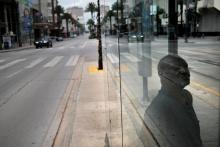
Antoniette Holt, director of the Office of Minority Health for the Indiana Department of Health, pointed to lack of reliable transportation as a challenge faced by some in African-American communities across the country, making it difficult for people to be on time for doctor’s appointments, often unforgiving when it comes to tardiness. This point is especially important during the pandemic, as social distancing practices are nearly impossible to maintain on public transit.
3. Their Calling Was to Lay Hands on the Sick. Then Came the Coronavirus.
How the pandemic transformed the lives and ministry of eight Manhattan priests, and what their example can teach the rest of us.
4. Christian ethics and the dilemma of triage during a pandemic
In the current COVID-19 pandemic, medical staff are making triage decisions about who will be saved by artificial ventilation and who will be allowed to die.

The way presidents and governments use language reflects the society they want to construct — and for the United States, presidents have long attempted to build a narrative that hides he real impacts of war and makes the United States look the part of a noble hero. Crisis and pandemics don’t start wars, and they won’t end war, but the United States may use crisis to beat the drums of war.

Nearly 20 years later, we must again push our government to expand global aid to fight the COVID-19 pandemic. As Christians, the moral imperative is clear. But in order to convince the powers at be, we must also argue that protecting the American economy and our national public health requires that we move from investing millions to investing billions — perhaps even trillions — in order to mount an adequate global response.

As of April 15, more than 101,000 people worldwide have died of the novel coronavirus. In the U.S., 42 states, the District of Columbia, and Puerto Rico have issued orders for people to stay in their homes to slow the spread. But with at least 1.6 million infected globally, the mortality rate has forced an increasing number of people to confront a topic they tend to otherwise avoid: death.
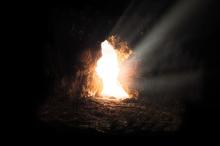
Easter was never meant to go back to normal; but was, and still is, intended to make all things new.
For Christians, it means the proclamation of release over suffering, hope over despair, and life over death. Still, there is no special immunity from COVID-19 granted by physically gathering to worship God.

I have thinking a lot about the after lately. What happens when this is all over? Will we be changed? Will we heed the lessons of a global pandemic, realize we are all connected to each other, fight for systems that keep our own selves safe by protecting the most vulnerable among us? Will we fight for a world where we could actually touch the miracle of a savior who died for the world and then rose again? Or will we only ever be able to glimpse it, but not hold on?
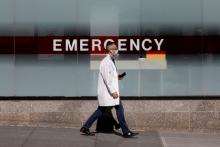
The likely death toll numbers confirmed this week by medical authorities as a result of the coronavirus pandemic are staggering.
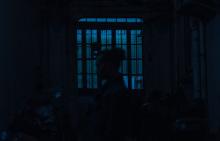
This past Sunday, some of the only Christians legally permitted to gather in person for worship in many states were those of us who gathered for worship in prisons. I am a chaplain at a women’s minimum custody prison, and I welcomed my congregation to worship with the words, “Tonight we are not just worshipping for ourselves. We are standing in the gap for Christians in the whole state and in much of the nation who are not permitted to gather together to read the lectionary, say the Lord’s Prayer, or celebrate the Eucharist.'
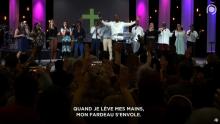
The prayer meeting kicked off the biggest cluster of COVID-19 in France — one of northern Europe's hardest-hit countries — to date, local government said. Around 2,500 confirmed cases have been linked to it.
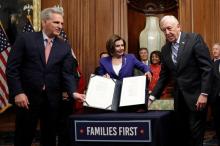
Like grocery store workers and first responders, domestic workers occupy a space on the frontlines of the pandemic. While some care for the elderly and people with chronic illnesses in their homes, others face dwindling job prospects, with little savings to stock up on the groceries and cleaning supplies Americans have flocked to stores for.
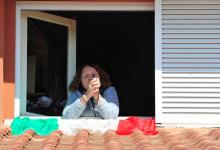
As President Trump has said he’d like to see “packed churches all over our country” on Easter Sunday to help him re-open the country and restart the economy, which he apparently thinks will help him get re-elected, we need the words of the Lord’s Prayer more than ever. The call to reopen comes despite the exact opposite instructions from health are professionals, along with governors and mayors across our nation, to maintain our social distance and closures until the danger of this modern plague are past us. Trump’s dangerous invitation to take our worship and prayers back into our churches before it is safe to do so is not only monstrous political irresponsibility, but religious sacrilege.
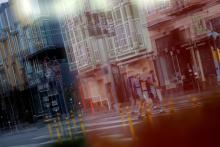
In this moment, Chinese and Asian American communities are facing the double stress of having to reckon with the racism and xenophobia they encounter, compounded with having to deal with the virus outbreak itself.
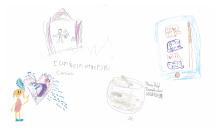
Editor's Note: As part of her piece "Using the Love Commandment to Talk COVID-19 With Your Kids," Christian ethicist Kate Ott collected drawings and quotes from children engaging in the topic of loving your neighbor during this health crisis. Here's what they had to say.
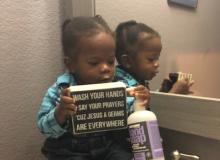
As adults are forced into major social and work-related changes, we can quickly lose patience with our children, forget their perspective matters, and resort to “just do it”-type responses. I want to encourage parents to take a deep breath and invite children into a new way of being in the world shaped by COVID-19. Children are morally resilient and creative when we give them the chance. So, how can we talk with our children about this pandemic? Let’s use the love commandment as our guide.

All of us are living into new daily rhythms. While that alone is disorienting, we are already moving from a life of daily inconvenience to one of fear. Institutions from sports to conferences to schools have transformed overnight. Many of our children — both schoo-age and young adults — are now home with us, which requires its own adjustments. And many, many people are finding themselves abruptly and unceremoniously out of work, with uncertain prospects for future paychecks as social distancing measures continue for an unknown length of time. Amid this, we must not let fear become a way of life. We remember the words of Jesus: Love can cast out fear. Leaning into love and learning what it really means to love our neighbors in this crisis will be crucial to our collective health and survival.
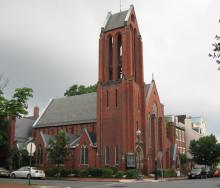
On March 7, our rector, Tim Cole, was diagnosed with COVID-19, the disease caused by the new coronavirus. Sleepless nights and frenzied days followed. The pace has been relentless. My concern for our community, especially its most vulnerable, my family, and my own health have left me tender and, at times, fearful. Yet, through it all, God remains close and grace abounds. While I am limited to phone calls and video chats, I have never felt closer to my people. We have whispered our fears, laughed at our misplaced anxieties, and committed ourselves to being church, even without our beloved building and cherished traditions.
Our new normal in a time of coronavirus: pastoring, loving our neighbor, preserving mental health, and more.
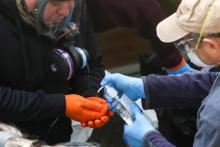
As I write this piece, my sons are not at school but home with me, because their elementary school decided to start Spring Break three days early to slow possible transmission of the virus and keep the community as safe as possible. While this has caused some inconvenience, I realize just how fortunate I am — I can work from home when needed and I have access to both sick leave and personal days. This is not the case for the majority of workers in the country. Congress will likely be voting soon on the Families First Coronavirus Response Act, which would provide urgently needed funding and provisions for free testing, three weeks of paid sick leave, unemployment insurance, supplemental food stamps, and nutritional support to kids who depend on school lunch. I’m hopeful and prayerful that the White House and Congress can transcend politics in this moment and pass this bill, because the virus knows no party and a bolder response is overdue.
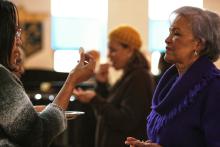
Churches across the United States are advising parishioners to avoid direct contact with fellow members as an oft-reiterated warning against spreading the coronavirus, which emerged in China last year and causes the sometimes deadly respiratory illness COVID-19.